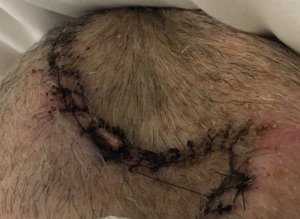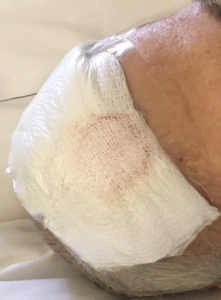Surgical site infection lawsuit? Senior Justice Law Firm focuses on nursing home abuse and neglect cases, including cases involving surgical site infection.
Surgical wound infection is unfortunately a common and preventable injury in long-term care facility. Our nursing home abuse attorneys explain about surgical site infection prevention, recognition and liability below. If your loved one suffered a serious injury or wrongful death due to a nursing home surgical scar infection, call our law firm today for a free case consultation.
Free case consultation: 888-375-9998
Why do Surgical Wounds get Infected in Nursing Home Settings?
 Often times, our loved ones are sent to a nursing home for rehabilitation after a routine surgery. Common surgeries in elderly patients that require short term rehabilitation include hip repairs, amputations, fall injuries, cardiac surgery, spinal surgery, GI operations and leg/ankle fractures. Short term rehabilitation in a nursing home may be required, even if the patient is alert and oriented. A short term rehab residency will assist the patient in learning to walk, bathe and ambulate independently again.
Often times, our loved ones are sent to a nursing home for rehabilitation after a routine surgery. Common surgeries in elderly patients that require short term rehabilitation include hip repairs, amputations, fall injuries, cardiac surgery, spinal surgery, GI operations and leg/ankle fractures. Short term rehabilitation in a nursing home may be required, even if the patient is alert and oriented. A short term rehab residency will assist the patient in learning to walk, bathe and ambulate independently again.
Regardless of the surgery involved, the incoming nursing home resident will have a surgical scar from the operation. Post-operatively, the surgeon will instruct the nursing home on how to care for this surgical wound. If the nursing home fails to follow the doctor’s wound care orders, the surgical site can become infected. This is a form of nursing home neglect and can lead to deadly consequences.
Preventing a Surgical Scar from Getting Infected
A skilled nursing facility is a twenty-four hour care facility. Federal and state law mandates that nursing homes hire enough caretakers, aides and nurses to care for the patients in the facility. This means that preventing a wound site from getting infected should be an easy task.
Keeping a surgical site sanitary can be accomplished by the following:
- Changing bandages daily, or more frequently, depending on doctor orders
- Changing bloody bandages or bandages with excessive discharge immediately
- Keeping germs, bacteria, fecal matter, urine and food out of surgical wounds
- Removal of debris, pathogens, and exudate in a sterile manner, with staff wearing gloves
- Gentle cleansing of the skin surrounding the surgical incision
- Keeping the surgical site dry (depending on doctor orders)
Early Recognition of a Nursing Home Surgical Site Infection is Critical
Potential signs or symptoms of infection may include:
- redness
- drainage of pus or liquid
- inflammation
- bleeding
- a foul odor
- pain at the surgical site
- developing a fever
 The nursing home staff must timely react to any signs of a wound site infection.
The nursing home staff must timely react to any signs of a wound site infection.
Delaying treatment of a surgical wound may allow the infection to fester and lead to irreversible damage. Immediate action must be taken to prevent serious injury or death.
Surgical site infections cost American taxpayers millions of dollars each year and are largely attributed to poor wound care. Statistics confirm that most surgical site infections are preventable. The CDC has found that surgical site infection “is among the most common preventable complication after surgery.”
Legal Liability Behind Nursing Home Surgical Site Infection Cases
It is the nursing home’s responsibility to follow doctor’s orders, clean the surgical wound and replace bandages. Unfortunately, when this is not done, terrible life-threatening infections can develop. Even worse, surgical site infection can lead to amputation or death.
The nursing home received thousands of dollars in health insurance payments to care for your loved one. In short term rehabilitation residents that are recovering from surgery, there are only a few tasks the nursing home must accomplish: 1) rehabilitate the patient and 2) keep the surgical wound clean.
Unfortunately, in today’s long-term care climate, nursing homes are often overpopulated and understaffed, in an attempt to maximize profits for the nursing home corporation. When a facility does not have the requisite staff to perform ordinary, simple tasks, like checking on a patient or changing a bandage, neglect occurs. This is generally how surgical site infections in nursing homes occur.
Nursing homes are legally responsible for any injuries which arise out of a preventable surgical site infection.
Consult with our Attorneys on your Surgical Wound Infection Lawsuit
If you or a loved one developed a surgical wound infection in a nursing home and have questions about the legal process, call our nursing home infection attorneys today.
Our lawyers are standing by to help. Let Senior Justice Law Firm assist you in determining whether proper surgical site cleaning procedures were followed. Our law firm focuses on nursing home neglect cases and we work on contingency fee, which means we only get paid if you recover money damages on your case.
Let Senior Justice Law Firm assist you on your journey to justice.

Call us today to speak with a compassionate and experienced patient neglect attorney: 888-375-9998

